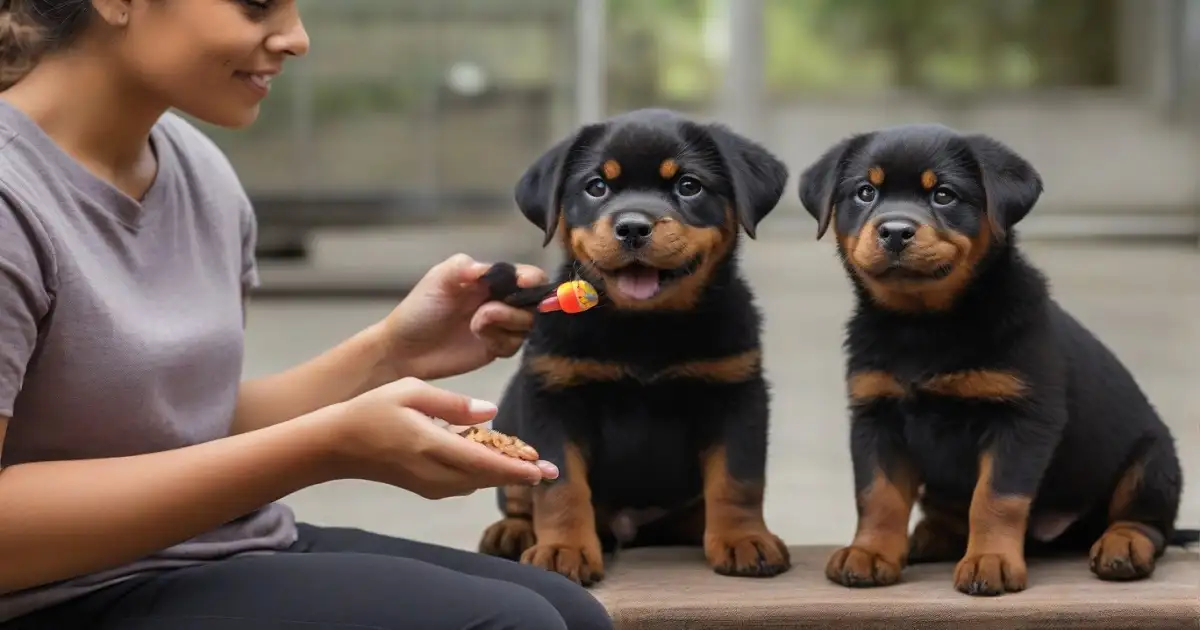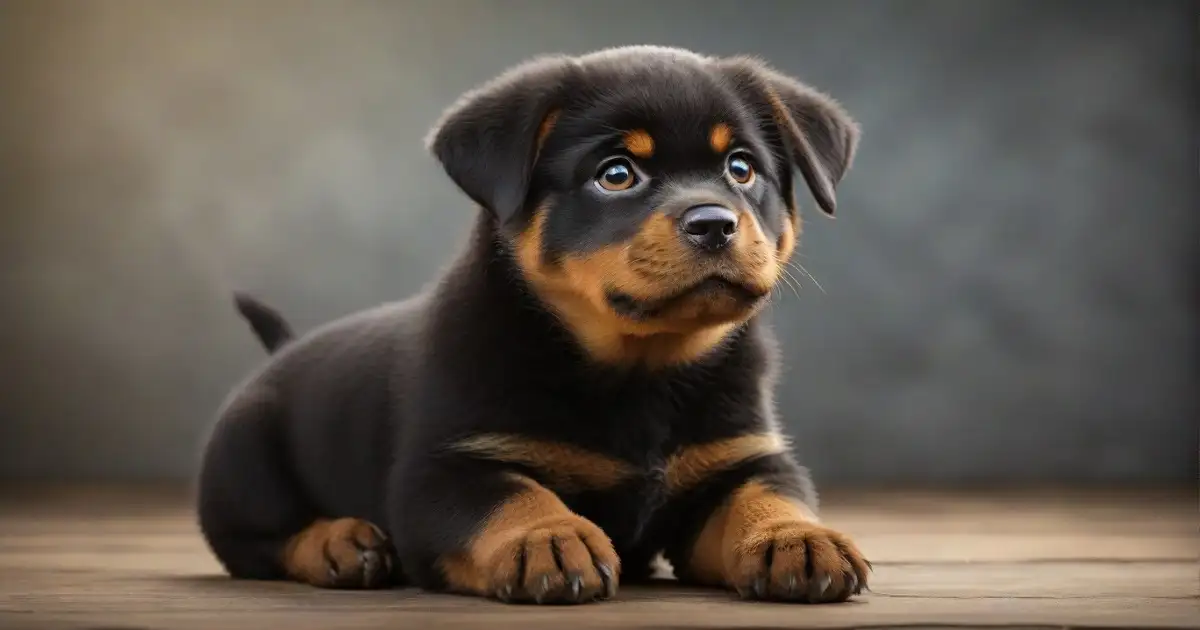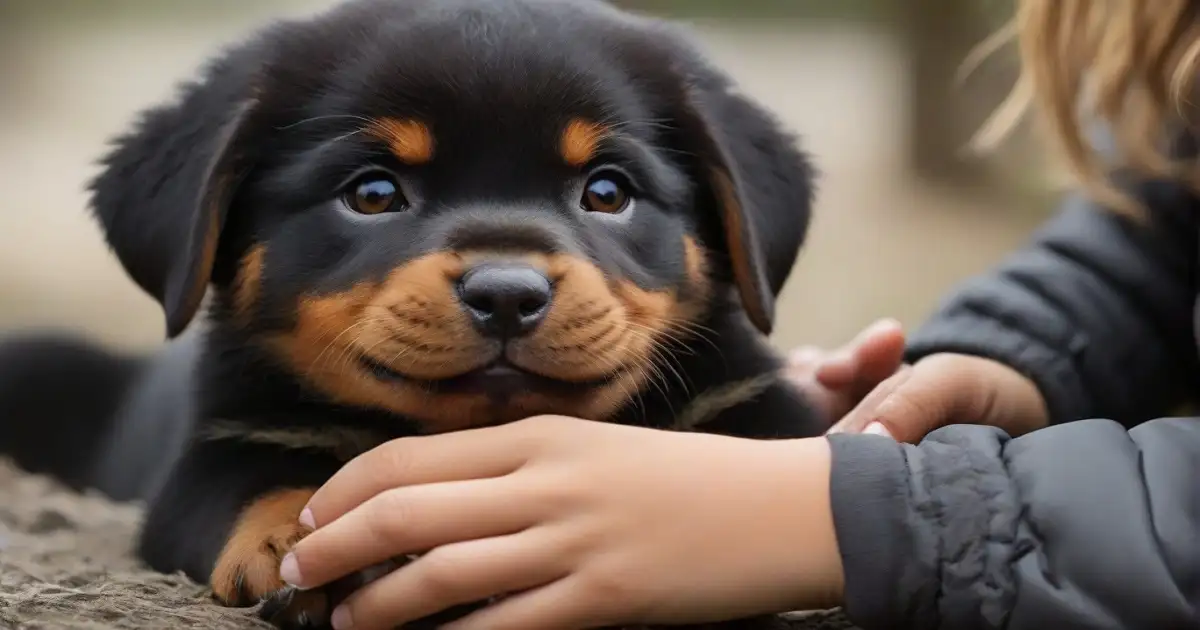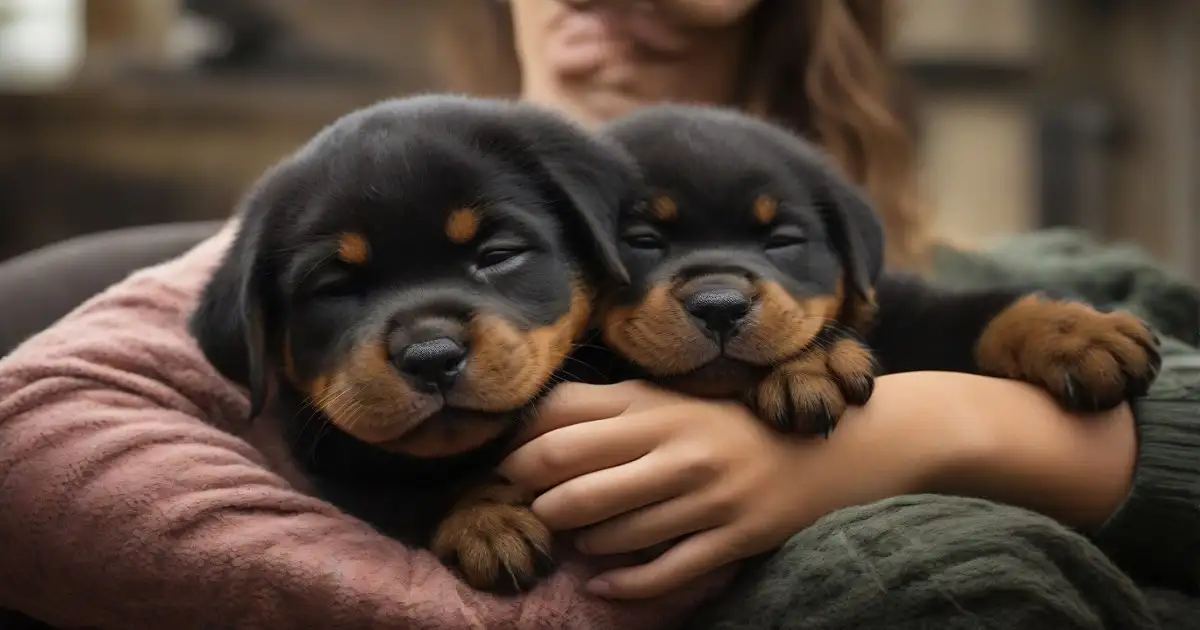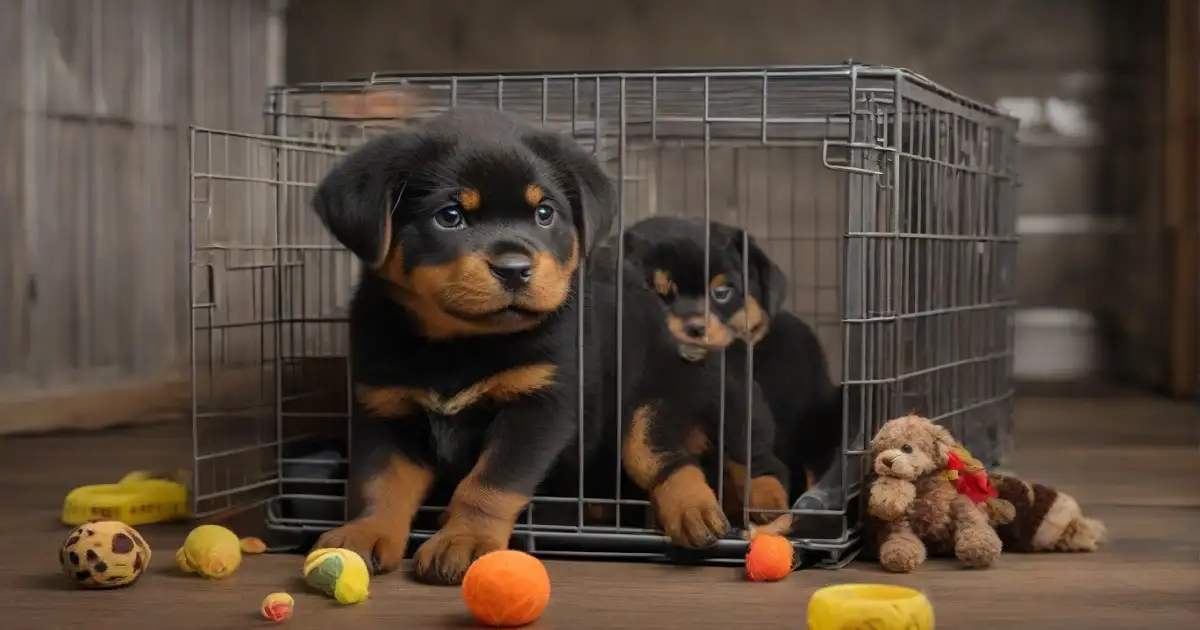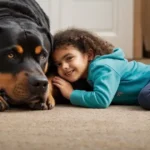Training a puppy starts from the moment you bring them home. But many folks wonder whether starting at 6 weeks old may be too soon! I’m here to tell ya – it’s not. Shaping a wee one’s behavior early is vital for their development.
So don’t fret if’n your new companion joins your family a smidge sooner than 8 weeks. With some patience and the proper know-how, you can set even a bitty 6-week-old cutie on the path toward becoming a polite pooch.
It just takes dedication and a pinch of creativity regarding motivation and engagement. Read on for pointers on laying the groundwork for success with your baby pup.
- Key teaching moments
- Relationship building
- Future goals
Health and Care Considerations for 6 Week Old Puppy Care
Now, I know some of y’all might be thinking – “Is it safe to be training such a **bitty pup?” Well, fair question indeed! First, schedule a vet visit if’n you adopted your little’un at 6 weeks. The doc will wanna ensure your baby’s health is tip-top and talk vaccinations to get ’em protected**.
Even though their attention span is short at this age, exposure to potential ailments lurks around every corner! So we gotta get that immune system boosted. Plus, the vet can advise on nutrition, activity limitations, and setting up the proper potty schedule, making housetraining easier.
Physical and mental development also moves as fast as molasses during these early weeks. So adjust your expectations on what your teacup companion can handle in training sessions. We talking 5-10 minutes max for a 6-week-old’s walnut-sized brain! With ample breaks for play, meals, and naps, of course.
We must puppy-proof the environment during their initial exploration and curiosity. So supervision remains key for keeping baby safe while those coordination skills slowly improve!
Foundational Skills to Start 6 weeks puppies On
Alrighty, time for the fun part – what can we teach a teeny-tiny 6-week-old pup?! I know those sweet little faces make it mighty hard to resist wanting to train all kinds of tricks right out of the gate! But for these kindergarten pups, we gotta stick to the basics.
Potty training stands first and foremost on that list! Now I know some breeds seem to get the gist quicker than others when it comes to pees and poops. But consistency with the schedule, offering tons of praise after they go to the proper spot, and not scolding accidents gently set all puppies on the path towards success!
We can also lightly introduce leashes, just letting them drag them around first. Too much restriction too soon overwhelms their squirrel brains! But letting them grow accustomed to the feeling builds their tolerance.
And when we can’t directly supervise, the crate becomes a pup’s best friend! Making it cozy with blankets and toys prevents destructive or dangerous decisions from bored babies! Plus it further reinforces that whole lovely potty training thing.
Last but not least – lots and lots of handling! Touching paws, ears, mouths, tails…desensitizing them to being prodded makes vet visits and grooming way more tolerable!
How’s that sound for skills to start our bitty puppy on?
Setting Up the Learning Environment
Well, now you got your wee-one walkin’ on a leash and peein’ on cue! Time to shape up their space for continued success! Cuz the proper set-up transforms even a squirmy pup into a focused trainee!
First things first – scan their surroundings with the discerning eye of your companion. Remove any danglers they can chew, obstacles to trip over, wee spaces to wiggle behind or under, and toxic things they ought not to ingest. Protect your belongings and wires, too – puppy-proofing prevents so many headaches!
Manage the stimulation as well – both mental and physical. An overtired pup’s naught but trouble! Remember, 6 weeks means cat naps galore. Provide a quiet sanctuary to snooze safely when your lil nugget gets nippy. And follow rambunctious play with focused training for best focus.
Don’t forget the motivation, too! Treats and toys abound for positive reinforcement. Mix it up with edibles – chicken, cheese, hot dogs…find what makes your pup tick! New squeakers and tug toys maintain high spirits, too. Just limit access to avoid boredom or possessive behaviors. Keep them wanting more!
And most important of all – stick to a CONSISTENT schedule. Puppies crave and thrive with predictable potty breaks, training, playtime, and sleep routines. Control the circumstances, and you control the success!
With some prep and planning, we can craft an A+ environment for our puppy where good habits flourish! Ready to socialize with that sweet summer child?
Socialization for 6 week puppy
Speakin’ of squirrels and stimuli, let’s segue to the ever-important topic of puppy socialization! Especially vital for an extra wee nibblet plucked from the litter at 6 weeks old. Cuz exposing pups positively to new friends and experiences sets ‘em up for confidence and success!
The goal’s habituating pup to handle anything life throws their way! We are talking people in all shapes ‘n sizes, friendly mutts ‘n pups, weird surfaces, loud machines, clinky dishes – the whole works! Smoothly introducing pups to diversity prevents future fear and funky behaviors.
Now, the nitty-gritty of it all – quality over quantity! Plopping a puppy amidst the hustle ‘n bustle quickly overwhelms their fetal focus. Make all new meetings ‘n greetings super tasty ‘n positive! Tossing treats, offering gentle pets, letting pups warm up at their pace…this builds trustworthy relationships!
With all new pals – people or canine – keep intros scent-only through barriers first. Letting them sniff each other out first while feeling safe prevents nasty surprises! Then, graduate to visual encounters on-leash before allowing off-leash engagement.
Be savvy about unfamiliar mutts – stick with vaccinated, gentle types to avoid sickness. Some pups fear men or kids, given their higher voices and erratic movements. So, coach new amigos on how to approach cautiously.
Mostly, though – make it fun! See the world through their cute button nose! Guide your fuzzy trainee’s long positive pathways towards confidence in every curious situation. That’s the heart ‘n soul of puppy rearing right thurr!
Clicker and Treat Training Fundamentals
It’s time to tackle the bread ‘n butter of any puppy training regime – clicker skills! Now I know the concept seems as complex as calculus – using a funny device to “capture” desired behaviors and then treating them. But breakin’ it down Barney-style, this technique’s easy as pie!
See, puppy brains are still too fresh to understand our garbled words. But that click! Noise? It universally tells them in their language – “Hey! Whatchu just did there is FANTASTIC!” Better than bacon, they love hearin’ that sound! Just be sure to click when their booty touches the ground in a sit and not after. Timing’s everything!
This brings us to the treatin’ – that scrumptious motivation for repeating awesome behaviors! Finding each pup’s kryptonite takes some experimentation. Gravitate towards soft, meaty bits easily gulped down. We want that puppy focused on learnin’, not chewin’ endlessly.
Keep sessions short n’ sweet, too – a few dozen reps, then bye-bye. Fuzzy brains burn out fast at this age! Reward lavishly, then let your wee trainee take a break before frustration sets in.
The most vital concept to cement early on – click means to give a treat every. dang. time. No freebies, no change-ups, no exceptions! Consistency builds habits, baby.
Get that association rock solid between the noise and delicious aftermath from the get-go, and you’ll be clickin’ your way to puppy perfection in no time!
Primary Skills to Teach a 6 week old puppy Now
Hoo doggy, onto the fun stuff – what can our bitty fluffballs learn at this delicate age? While those Tiny Torpedo pups lack attention spans, buildin’ blocks established early stick for life! So let’s prioritize some puppy Kindergarten 101 skills, shall we?
First up – their name! This becomes Puppy Training 101 for all future behaviors. Say pup’s name, wait for eye contact, click, treat! Add a hand signal like snapping eventually, too. Master this basic first and the whole darn world will open up!
We also wanna work charging up those powder puff legs with some conditioning. Asking for quick sits and releasing to play builds flexibility and body awareness. The same goes for stays once sitting reliably – ask for a few seconds of stillness before freedom. Building duration takes insane patience, though, so go slowly!
Operants condition simple cues, too, like come, touch, and spin. Keep sessions short but model new concepts daily. Use high-reward markers to capture and imprint budding behaviors. And release frequently to keep it fun!
Get pups comfortable with basic handling also – restrain gently, handle paws, peek at teeth. Desensitize them now so vet visits and grooming feel familiar. Go super slow, but make it worth their while with praise and munchies!
That’s plenty for an infant pup’s sponge-like state! Take baby steps starting these Kindergarten concepts, and you’ll nurture an engaged trainee in no time!
What to Prioritize in the Coming Weeks
My oh my, our tiny pupils grow fast, don’t they? Seems like just yesterday, they wobbled around on rickety legs! But in the blink of an eye, fluffy becomes….well, less fluffy! All gangly angles fillin’ out to sturdy stock.
So, while our initial training goals focused on baby basics, let’s chat priorities goin’ forth into the fearsome puppyhood monthly milestones!
That Landshark stage looms large for all owners in weeks 8-20. Razor milk teeth wreak havoc on defenseless ankles as pups explore their mouthiness!
So continue emphasizing gentle play and that all-important bite inhibition teachin’ they’d get from mama. Redirect gnashin’ mouths to proper chew toys, offerin’ tasty trades for human flesh!
Balance freedom with safety, too, as motor skills and independence blossom. Expand access to larger spaces in your humble abode once reliably potty trained and less nibbly. However, utilizing crates or confinement when solo time risks naughty behaviors. Prevention’s the name o’ the game!
Lastly – keep prioritizing that socialization! Introduce pups to new pals, environments, and challenges daily.
Seek out training classes for continued bonding. Make everything positive and rewarding. Cuz properly nurtured puppies become delightful companions when raised mindfully with compassion from the start!
The Importance of Setting Expectations Realistically
Listen here, folks – a pup still wet behind the ears often tests their poor owners’ mortal patience! Try not to lose heart when your dandy lil darling shreds yet another shoe or has another accident indoors.
A 6 week’s puppy brain is a bit more undeveloped than a goldfish’s, y’see! So they can’t grasp human wishes ‘n wants just yet. Focus instead on her slow but measurable daily gains toward those socialization, potty training, and basic obedience goals.
Celebrate like the dickens for every step forward in the right direction, no matter how tiny. Stay the course, and that progress will snowball into a companion you adore beyond reason.
But cut those precious babes some slack during these challenging developmental windows. Trust the process, and they’ll amaze you in time!
Conclusion
Well, we’re nearing the end of our journey together, folks! From squirmy squeakers to confident companions, remember – passionate positive reinforcement transforms destructive delinquents into dedicated dynamos! But to fully reap those future returns, it pays to check expectations at the door when dealing with an infant pup.
Cuz lordy, do new owners buckle in dismay as darling demon spawn unleash tiny teeth ‘n puddles galore those first few weeks! But friends – all babies misbehave, be they skin or fur. So, reset mindsets from the get-go when raising a lil’ chum from 6 weeks.
This, too, shall pass, as the adage goes! Gently trod the pathway laid before ya. Revel in the fleeting, precious moments of milk breath and puppy fuzz before the inevitable all-paws-on-deck chaos of adolescence barrels forth!
Stay consistent, stay patient, and freakin’ have some fun! Puppy parenthood offers unparalleled opportunities for relationship building and goofy memories.
No training journey looks identical, but armed now with the basics, tailor things to what makes your unique pooch tick. They’ll love and wow you for it in their way. That’s the true magic of raising canine companions from wee babes.
So take a deep breath and dive in without hesitation if your new babe joins the household a pinch early at 6 weeks. Just give them your whole heart ‘n soul. The rest smooths itself out over time. Happy trainin’ y’all!
